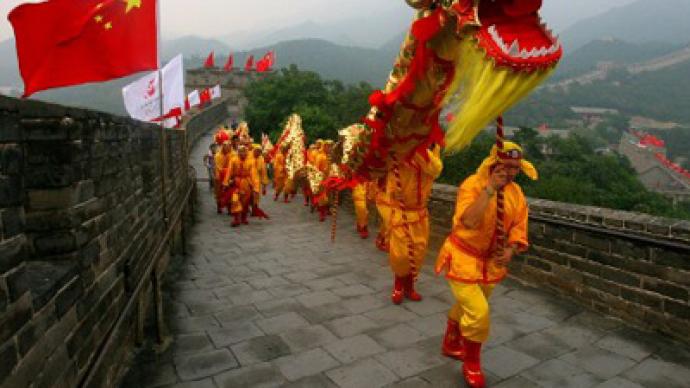When will China become the number one world power?

On the eve of a transition of power to the 5th generation of China’s political elites, China has become a key global player. Analyst Igor Panarin thinks that China will soon become leading power, but only on the condition of an alliance with Russia.
In his article for RT, the analyst explains his view. In the run-up to the 62nd anniversary of the People’s Republic of China, we have China’s first supercomputer coming out, running on domestically manufactured processors. That was a surprise for the US, which is only planning to launch its own next-generation supercomputer in 2013. The CPU, Sunway Bluelight MPP, was set up in China’s NationalSupercomputingCenter in Jǐnán, the capital of China’s eastern province of Shandong, in September.China’s appearance is rapidly changing as well with new skyscrapers, airports and roads being built. China is quickly taking its share in areas that it had never worked in. For instance, China is now actively investing in foreign assets. It is currently listed among the world’s top 5 investors, with the majority of its investments going to Africa, Latin America, Asia and Europe. The Chinese authorities are concerned over the escalation of the second wave of the global financial crisis, which may threaten China’s plans to become the global leader, since the country’s GDP growth figure over the first wave of the crisis was a mere 10%.China is making efforts to counteract the crisis. This was made clear at the meeting of the SCO [The Shanghai Cooperation Organization, an intergovernmental mutual-security organization which was founded in 2001 in Shanghai by the leaders of China, Kazakhstan, Kyrgyzstan, Russia, Tajikistan, and Uzbekistan – RT] prime ministers on November 7th. China, backed by Russia, proposed to create an intergovernmental reserve bank or fund. China’s State Council Premier Wen Jiabao had many other ideas. He said that free movement of goods, services and capital on SCO territory should be provided for, which would require the governments’ support. The construction of a united infrastructural network for transportation, energy and communication should be accelerated, Wen Jiabao said. China, for its part, is ready to provide credits on relaxed conditions to SCO’s infrastructural projects. Another idea put forward by Wen Jiabao, to increase the share of national currencies in bilateral trade, was welcomed by Russia’s Prime Minister Vladimir Putin.China’s mechanism of succession is a crucial prerequisite for its prospective global leadership. The Chinese Communist Party has fully outlined the future composition of its new generation of leaders, known as the Fifth Generation. The Chinese have carefully studied the fate of the Soviet Union in order to avoid similar mistakes. The Soviet ruling elite started stagnating and isolating itself following the death of Joseph Stalin, with any rotation of government and party leadership effectively disabled. China’s Communists have drawn their lesson and developed a mechanism to ensure rotation of top- and mid-level officials and prevent their elite from fossilizing. For purposes of China’s prospective global leadership, its relations with Russia need a new essence. It is crucial for Beijing that Russia should remain consistent, stable and predictable, both in its domestic policies and in its strategic partnership with China. Russia is essentially China’s strategic rearguard, its northern logistic-support base. Chinese analysts and officials alike often admit that even though China’s economic co-operation with Russia is a fraction of that with the United States, the political relationship between Beijing and Moscow is much closer than US-China relations. This is a key factor for understanding the BRICS and the SCO, which are exactly the modalities where Chinese and Russian interests are coupled back to back and provided with mutual political and economic support. Following the collapse of the Soviet Union, China took its place in counter-balancing the Western Anglo-Saxon elite and gradually developed into a global player. The present-day world already has two global players, each with their own specific advantages and downsides. China’s problem is the 300-year break between their last great power and their present global posture. They lack the historic experience of a worldwide empire such as Britain, as well as Britain’s unique financial expertise and PR skills. It is exactly to this end that China might find the expertise of the Russian Empire and the Soviet Union extremely relevant and helpful. So when are the two global players likely to come to a decisive face-off? My take is it will happen in 2016: that is when Taiwan is projected to be reunited with China, according to Beijing’s strategic plan. Should that become reality, China will be promoted to the world’s Number One superpower.
Prof. Igor Panarin, Doctor of Political Sciences, specially for RT
The statements, views and opinions expressed in this article are those of the author and do not necessarily represent those of RT.












